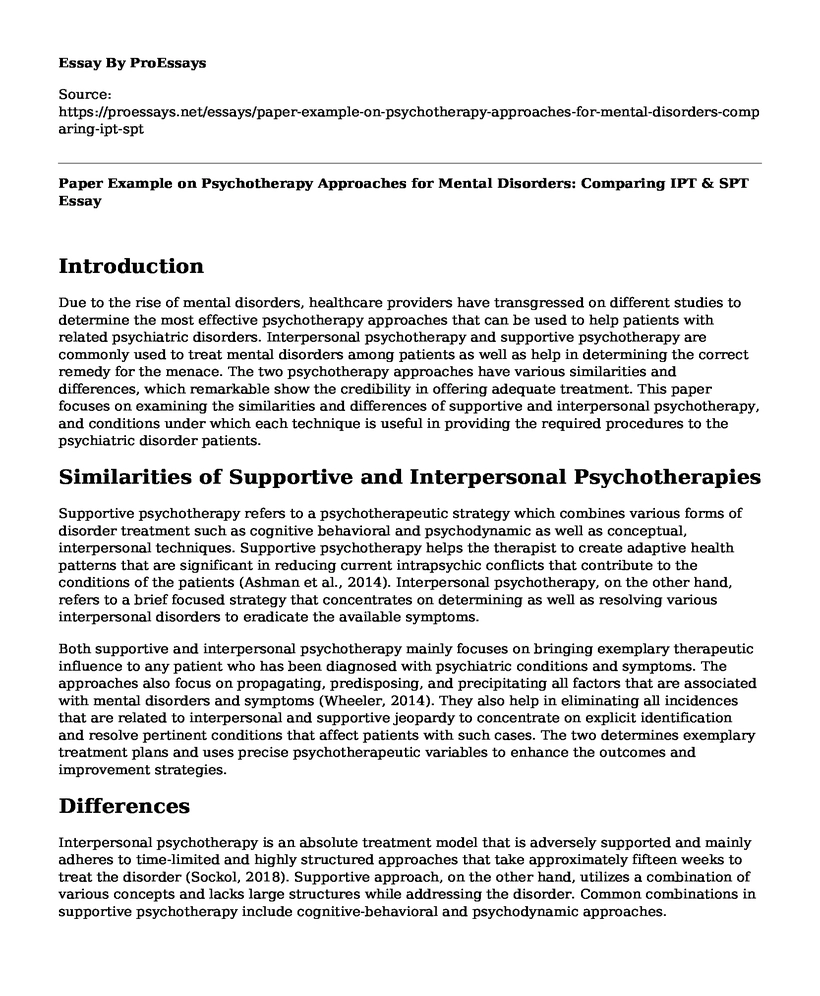Introduction
Due to the rise of mental disorders, healthcare providers have transgressed on different studies to determine the most effective psychotherapy approaches that can be used to help patients with related psychiatric disorders. Interpersonal psychotherapy and supportive psychotherapy are commonly used to treat mental disorders among patients as well as help in determining the correct remedy for the menace. The two psychotherapy approaches have various similarities and differences, which remarkable show the credibility in offering adequate treatment. This paper focuses on examining the similarities and differences of supportive and interpersonal psychotherapy, and conditions under which each technique is useful in providing the required procedures to the psychiatric disorder patients.
Similarities of Supportive and Interpersonal Psychotherapies
Supportive psychotherapy refers to a psychotherapeutic strategy which combines various forms of disorder treatment such as cognitive behavioral and psychodynamic as well as conceptual, interpersonal techniques. Supportive psychotherapy helps the therapist to create adaptive health patterns that are significant in reducing current intrapsychic conflicts that contribute to the conditions of the patients (Ashman et al., 2014). Interpersonal psychotherapy, on the other hand, refers to a brief focused strategy that concentrates on determining as well as resolving various interpersonal disorders to eradicate the available symptoms.
Both supportive and interpersonal psychotherapy mainly focuses on bringing exemplary therapeutic influence to any patient who has been diagnosed with psychiatric conditions and symptoms. The approaches also focus on propagating, predisposing, and precipitating all factors that are associated with mental disorders and symptoms (Wheeler, 2014). They also help in eliminating all incidences that are related to interpersonal and supportive jeopardy to concentrate on explicit identification and resolve pertinent conditions that affect patients with such cases. The two determines exemplary treatment plans and uses precise psychotherapeutic variables to enhance the outcomes and improvement strategies.
Differences
Interpersonal psychotherapy is an absolute treatment model that is adversely supported and mainly adheres to time-limited and highly structured approaches that take approximately fifteen weeks to treat the disorder (Sockol, 2018). Supportive approach, on the other hand, utilizes a combination of various concepts and lacks large structures while addressing the disorder. Common combinations in supportive psychotherapy include cognitive-behavioral and psychodynamic approaches.
Secondly, supportive psychotherapy aims at enhancing the health status of the patient through use of adaptive patterns to minimize the current conflicts in intrapsychic factors that contribute to mental disorder managements among patients (Cuijpers et al., 2016). Conversely, the interpersonal approach aims to identify and to resolve problems that prevail in different interpersonal relationships. As a result, the latter ensures that the therapist is agitated in evaluating significant relational patient's aspects that might influence their lives and mentalities.
Additionally, in terms of application, supportive psychotherapy is used in administering treatments to patients who are suffering from behavioral, psychiatric problems like addictions to alcohol among others (Gelo, Pritz & Rieken, 2014). It majorly helps therapists to provide adequate assistance to patients with such problems to sustain their health and efficiently cope with new mechanisms in handling other issues (Wheeler, 2014). Interpersonal psychotherapy, on the other hand, focuses on mental disorder treatment, which is related to how people interact with each other within their social setting. It addresses the underlying problems and provides an excellent way of lessening mental conditions.
Conclusion
In conclusion, as a professional nurse, the use of interpersonal psychotherapy is the most important one because it presents various ways of treating mental problems. The approach also provides particular emphasis on the significance of the interpersonal relationship. However, if the connection in the interpersonal approach is weak, it adversely contributes to several psychiatric disorders such as a change in mood and behavior among people. Mood and behavior also contribute to the development of mental disorders among patients. However, the efficacy of using psychotherapy in treating mental disorders, the use of the interpersonal approach is more efficient as compared to a supportive one, which is adversely limited to various behavioral problems.
References
Ashman, T., Cantor, J. B., Tsaousides, T., Spielman, L., & Gordon, W. (2014). Comparison of cognitive behavioral therapy and supportive psychotherapy for the treatment of depression following traumatic brain injury: a randomized controlled trial. The Journal of head trauma rehabilitation, 29(6), 467-478. doi: 10.1097/HTR.0000000000000098
Cuijpers, P., Donker, T., Weissman, M. M., Ravitz, P., & Cristea, I. A. (2016). Interpersonal psychotherapy for mental health problems: a comprehensive meta-analysis. American Journal of Psychiatry, 173(7), 680-687. https://doi.org/10.1176/appi.ajp.2015.15091141
Gelo, O. C., Pritz, A., & Rieken, B. (Eds.). (2014). Psychotherapy research: Foundations, process, and outcome. Springer.
Sockol, L. E. (2018). A systematic review and meta-analysis of interpersonal psychotherapy for perinatal women. Journal of affective disorders, 232, 316-328. https://doi.org/10.1016/j.jad.2018.01.018
Wheeler, K. (Ed.). (2014). Psychotherapy for the advanced practice psychiatric nurse: A how-to guide for evidence-based practice (2nd ed.). New York, NY: Springer Publishing Company.
Cite this page
Paper Example on Psychotherapy Approaches for Mental Disorders: Comparing IPT & SPT. (2023, Jan 26). Retrieved from https://proessays.net/essays/paper-example-on-psychotherapy-approaches-for-mental-disorders-comparing-ipt-spt
If you are the original author of this essay and no longer wish to have it published on the ProEssays website, please click below to request its removal:
- Mental Health Situation Analysis in Canada
- Personal Essay Example: My Personal Strengths
- The Reason Why People Change their Behavior - Paper Example
- Psychodynamic Approaches to Counseling and Therapy
- Aggressive Behavior: Paper Example
- How Does Stress Affect the Productivity of Interpreter? - Research Paper
- Chimamanda Adichie's Journey from Nigeria to America: Education, Privilege, and Experience - Essay Sample







